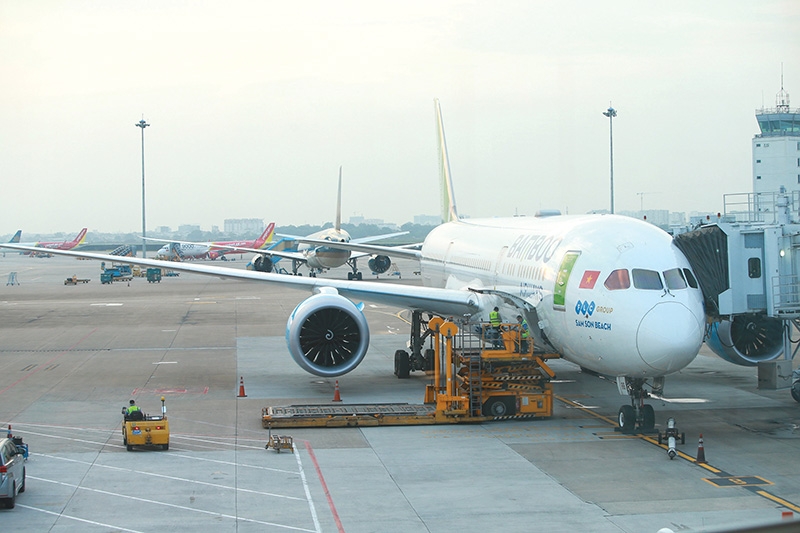Big-shot groups aim again for IPO success
 |
| Bamboo Airways is looking to raise $200 million with an IPO in the US. Photo: Duc Thanh |
Last week investors were hoping to make a killing after VinFast – the automaker of Vietnamese behemoth Vingroup – was said to be considering an initial public offering (IPO) in the New York Stock Exchange (NYSE), which could raise as much as $2 billion.
Despite a number of flops by other Vietnamese peers, media outlets such as Bloomberg and Reuters reported that VinFast could be valued at around $50 billion after a successful listing – seen as surprising given that car giant Ford was valued at $144 billion in 2018, while VinFast is only a few years old. News of the consideration led Vingroup’s ticker to rise significantly in multiple consecutive trading sessions last week.
Meanwhile, Bamboo Airways, a subsidiary of FLC Group, also revealed plans to raise up to $200 million in an overseas IPO in the third quarter of this year, particularly in the United States. The company aims to secure market capitalisation of up to $4 billion.
“The IPO will be part of our efforts to expand our services globally. We will start conducting chartered flights to the US in July and target the launch of non-stop commercial flights between Ho Chi Minh City and San Francisco in September, with an initial frequency of three flights per week,” said company chairman Trinh Van Quyet.
Quyet revealed that the carrier has been working with an international auditing firm for a potential IPO on the NYSE. Previously, Bamboo Airways signalled its intention to file for an IPO in Vietnam itself, but Quyet said that was now “a backup plan, depending on market conditions,” according to Reuters.
Kent Wong, head of Banking and Finance Capital Markets at VCI Legal, noted that Vingroup-affiliated companies have tried their luck in the overseas listing game before. In 2014, the conglomerate failed in listing on the Singaporean Stock Exchange (SGX). Huy Vietnam, owner of the Mon Hue restaurant chain, also tried to list in Hong Kong five years ago.
In fact, a number of major domestic corporations have not stood up to the scrutiny of global public markets.
Previously, VNG Corporation – Vietnam’s first unicorn – signalled its intention to file for an IPO in the tech-heavy NASDAQ. Budget-cost carrier Vietjet also followed suit, saying it would ramp up its effort to list on the NYSE.
In 2008, dairy giant Vinamilk had been approved on the SGX, but its IPO plan was consistently delayed and the group is still nowhere closer to entering the regional bourse.
In 2019, Quyet also announced that his group was ramping up efforts to be listed on the SGX at the bourse’s 20th anniversary event, a move which he said would “bolster its business, hone its image, and replenish overseas capital.”
“The SGX is a top international destination which provides value to businesses that want to extend their overseas ambition. FLC aims to become listed on the SGX next year or in 2021,” he said at the time.
Wong of VCI Legal noted that Vietnamese companies might need 2-3 years to prepare for overseas listing, mainly due to differences between accounting standards and high standards of corporate governance and internal controls in overseas stock exchanges.
“While it is applaudable that VinFast is looking to raise capital through an alternative channel overseas, I would query whether it has objectively considered its readiness,” he told VIR. “Breaking into global markets which are highly competitive will be tough going. The long-term strategy of the company and timing are also key. Given the ‘new normal’, external factors and the strong macroeconomic conditions of Vietnam do not make compelling enough arguments.”
Vietnamese regulators, on the other hand, can develop the legal framework to be more in line with international standards. Recent reforms to the Law on Securities and the Law on Prevention of Money Laundering are positive signs. In addition, cooperation with more overseas exchanges will give potential issuers more chances for dual listings and, as a result, more liquidity.
Michael Kokalari, chief economist at VinaCapital said, “The government should focus on developing Vietnam’s capital markets first, and should especially focus on making it easier for foreign investors to bring money into Vietnam before regulators encourage Vietnamese companies to list their shares on foreign stock markets.”
Wong agreed, adding, “The NASDAQ has been tightening listing standards due to the spate of Chinese companies listing, for example. However, the special purpose acquisition company route looked at by VinFast might be achievable, provided there is a strong sponsor.”
What the stars mean:
★ Poor ★ ★ Promising ★★★ Good ★★★★ Very good ★★★★★ Exceptional
Related Contents
Latest News
More News
- VNPAY and NAPAS deepen cooperation on digital payments (February 11, 2026 | 18:21)
- Vietnam financial markets on the rise amid tailwinds (February 11, 2026 | 11:41)
- New tax incentives to benefit startups and SMEs (February 09, 2026 | 17:27)
- VIFC launches aviation finance hub to tap regional market growth (February 06, 2026 | 13:27)
- Vietnam records solid FDI performance in January (February 05, 2026 | 17:11)
- Manufacturing growth remains solid in early 2026 (February 02, 2026 | 15:28)
- EU and Vietnam elevate relations to a comprehensive strategic partnership (January 29, 2026 | 15:22)
- Vietnam to lead trade growth in ASEAN (January 29, 2026 | 15:08)
- Japanese business outlook in Vietnam turns more optimistic (January 28, 2026 | 09:54)
- Foreign leaders extend congratulations to Party General Secretary To Lam (January 25, 2026 | 10:01)

 Tag:
Tag:




















 Mobile Version
Mobile Version